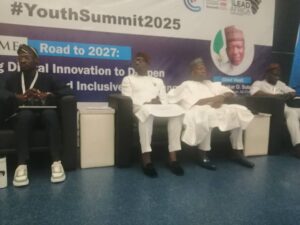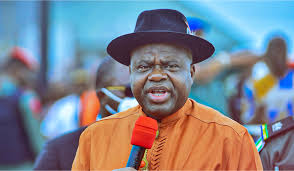By: Goodluck E. Adubazi, Abuja.
As Nigeria prepares for the 2027 general elections, the Deputy Speaker of the House of Representatives, Hon. Benjamin Okezie Kalu, has expressed concern that only 23 percent of rural communities in the country have access to the internet, despite Nigeria boasting over 103 million internet users and 205 million active digital connections.
Kalu made this known on Wednesday at the opening of the 2025 Youth Summit organized by the National Institute for Legislative and Democratic Studies (NILDS) in Abuja. The two-day event, themed “Road to 2027: Leveraging Digital Innovation to Deepen Citizen Participation and Inclusive Governance,” coincided with the 10th anniversary of World Youth Skills Day.
The Deputy Speaker said the digital divide poses a major challenge to inclusive governance and citizen participation ahead of the 2027 elections.
“We gather not just to celebrate potential but to commit ourselves to the urgent national task of leveraging digital innovations to deepen citizen participation and build a truly inclusive democracy,” Kalu stated.
“How do we build an inclusive, digitally enabled democracy when nearly half of our population remains digitally excluded?” he asked.
Kalu emphasized the need for stronger infrastructure and institutional reforms to restore electoral trust, noting that tools like the Bimodal Voter Accreditation System (BVAS) and the INEC Results Viewing Portal (IReV) must be supported by reliable digital infrastructure.
He revealed that the National Assembly’s Constitution Review Committee is already working on reforms to strengthen electoral integrity, gender inclusion, and accountability.
“Our committee is reviewing the Electoral Act to address the digital integrity gaps witnessed in the 2023 elections. Legislative reforms are urgent and non-negotiable if we must safeguard our democracy before 2027,” he said.
Earlier, in his welcome address, the Director-General of NILDS, Prof. Abubakar Sulaiman, highlighted the crucial role of Nigerian youths—who constitute over 60 percent of the population—in shaping the country’s democratic future.
Prof. Sulaiman noted that despite their potential, youths remain largely marginalized in governance, holding less than 2 percent of elective positions nationwide. He described this as a democratic imbalance that must be corrected through digital empowerment and inclusive policy reforms.

“Our country stands at a pivotal moment in its democratic journey. With the right digital tools and civic education, young Nigerians can become active contributors to governance, not just spectators,” Sulaiman said.
The NILDS DG emphasized that digital platforms such as X (Twitter), TikTok, and Facebook have become powerful tools for civic engagement and political mobilization, citing the #EndSARS movement as an example of how youth voices can influence national change.
Both leaders urged Nigerian youths to leverage technology for political engagement rather than disengagement.
“Use your voice on social media to demand accountability, support candidates who share your values, and even run for office,” Kalu charged the participants.
“Democracy is not a spectator sport.”
The summit brought together policymakers, legislators, civil society actors, and youth representatives to explore ways of promoting digital literacy, governance inclusion, and democratic participation ahead of the 2027 polls.














